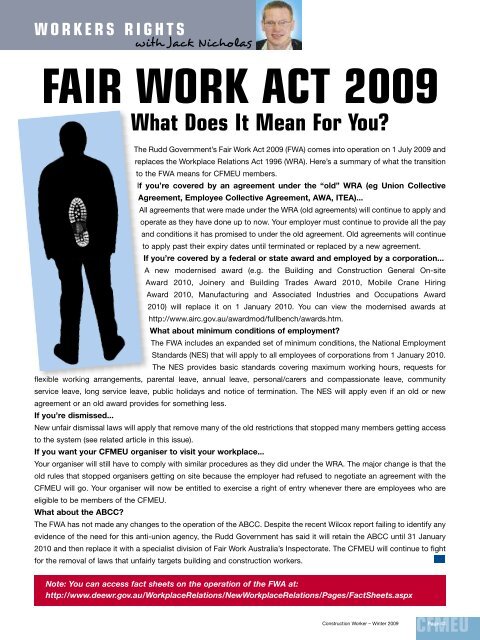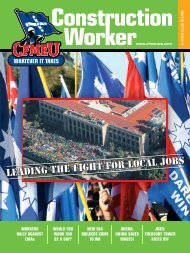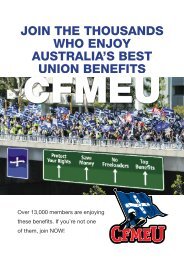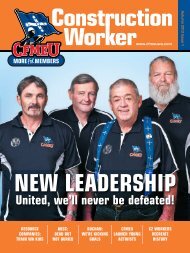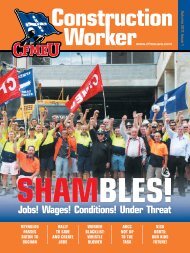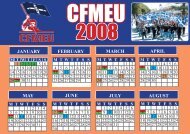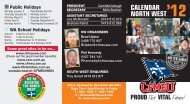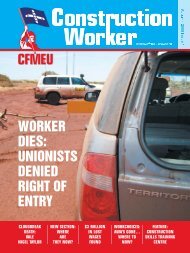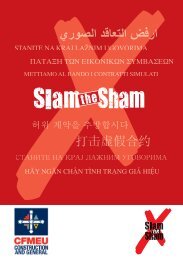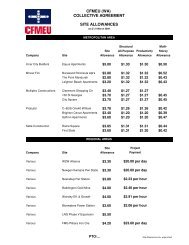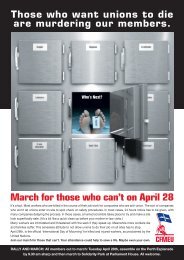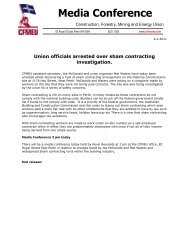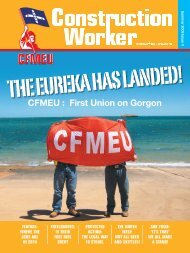Winter Issue 2009 - cfmeu
Winter Issue 2009 - cfmeu
Winter Issue 2009 - cfmeu
You also want an ePaper? Increase the reach of your titles
YUMPU automatically turns print PDFs into web optimized ePapers that Google loves.
W O R K E R S R I G H T S<br />
with Jack Nicholas<br />
FAIR WORK ACT <strong>2009</strong><br />
What Does It Mean For You?<br />
The Rudd Government’s Fair Work Act <strong>2009</strong> (FWA) comes into operation on 1 July <strong>2009</strong> and<br />
replaces the Workplace Relations Act 1996 (WRA). Here’s a summary of what the transition<br />
to the FWA means for CFMEU members.<br />
If you’re covered by an agreement under the “old” WRA (eg Union Collective<br />
Agreement, Employee Collective Agreement, AWA, ITEA)...<br />
All agreements that were made under the WRA (old agreements) will continue to apply and<br />
operate as they have done up to now. Your employer must continue to provide all the pay<br />
and conditions it has promised to under the old agreement. Old agreements will continue<br />
to apply past their expiry dates until terminated or replaced by a new agreement.<br />
If you’re covered by a federal or state award and employed by a corporation...<br />
A new modernised award (e.g. the Building and Construction General On-site<br />
Award 2010, Joinery and Building Trades Award 2010, Mobile Crane Hiring<br />
Award 2010, Manufacturing and Associated Industries and Occupations Award<br />
2010) will replace it on 1 January 2010. You can view the modernised awards at<br />
http://www.airc.gov.au/awardmod/fullbench/awards.htm.<br />
What about minimum conditions of employment?<br />
The FWA includes an expanded set of minimum conditions, the National Employment<br />
Standards (NES) that will apply to all employees of corporations from 1 January 2010.<br />
The NES provides basic standards covering maximum working hours, requests for<br />
flexible working arrangements, parental leave, annual leave, personal/carers and compassionate leave, community<br />
service leave, long service leave, public holidays and notice of termination. The NES will apply even if an old or new<br />
agreement or an old award provides for something less.<br />
If you’re dismissed...<br />
New unfair dismissal laws will apply that remove many of the old restrictions that stopped many members getting access<br />
to the system (see related article in this issue).<br />
If you want your CFMEU organiser to visit your workplace...<br />
Your organiser will still have to comply with similar procedures as they did under the WRA. The major change is that the<br />
old rules that stopped organisers getting on site because the employer had refused to negotiate an agreement with the<br />
CFMEU will go. Your organiser will now be entitled to exercise a right of entry whenever there are employees who are<br />
eligible to be members of the CFMEU.<br />
What about the ABCC?<br />
The FWA has not made any changes to the operation of the ABCC. Despite the recent Wilcox report failing to identify any<br />
evidence of the need for this anti-union agency, the Rudd Government has said it will retain the ABCC until 31 January<br />
2010 and then replace it with a specialist division of Fair Work Australia’s Inspectorate. The CFMEU will continue to fight<br />
for the removal of laws that unfairly targets building and construction workers.<br />
Note: You can access fact sheets on the operation of the FWA at:<br />
http://www.deewr.gov.au/WorkplaceRelations/NewWorkplaceRelations/Pages/FactSheets.aspx<br />
Construction Worker – <strong>Winter</strong> <strong>2009</strong> Page 43<br />
CFMEU


